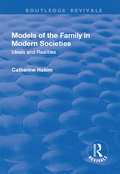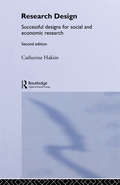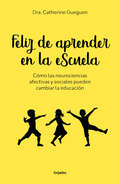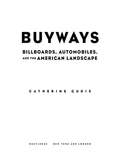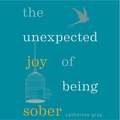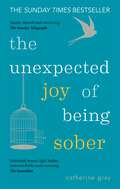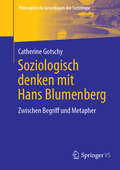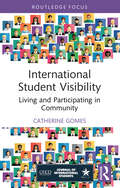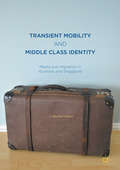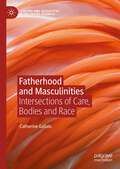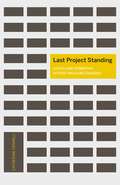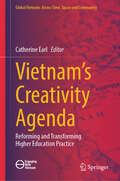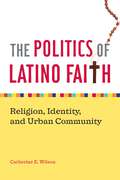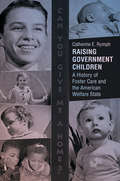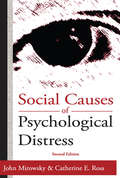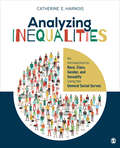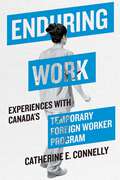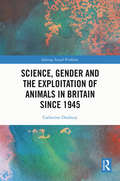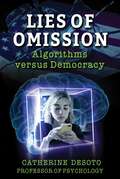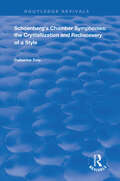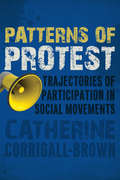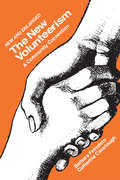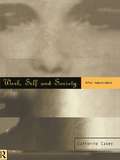- Table View
- List View
Models of the Family in Modern Societies: Ideals and Realities
by Catherine HakimThis title was first published in 2003. This text reports on two nationally representative surveys of men and women in Britain and Spain, the former being funded by the Future of Work Research Programme and conducted by the ONS. Catherine Hakim presents a study of ideal models of the family and family roles, work orientation, patriarchal values and lifestyle preferences, showing how these impact on women's marital histories, fertility, employment patterns and occupational segregation, but not on men's labour market participation. Lifestyle preferences and work orientations have a strong impact on women's activities, and especially on married women's choices, but patriarchal values have almost no impact on behaviour. The book also covers educational homogamy, housing classes, labour mobility and contrasts between ethnic minority groups in core values and labour market participation.
Research Design: Succesful Designs for Social Economics Research (Contemporary Social Research Ser. #Vol. 13)
by Catherine HakimProviding a practical overview for graduates and professional researchers, this book highlights the central issues involved in the design of medium to large scale social and economic research. Covering both theoretical and policy research Hakim sets out the key features, strengths and limitations of eight main types of study, with illustrations from real life research of the kinds of questions each can best be used to answer. This book also offers a more general pragmatic discussion of strategies for choosing between one design and another, and on how different types of study can be successfully combined in wider ranging research programmes. In this expanded second edition the author has added new material on areas of contemporary significance across the social and economic sciences. New features to this edition are:* a chapter on cross-national comparative studies* more examples throughout the text of comparative research both within Europe and across modern societies* discussions of student theses, advocacy research, selection effects and collaboration.
Feliz de aprender en la escuela
by Catherine GueguenTodos los niños sienten, en los primeros años de su vida, una necesidad innata de aprender. Sin embargo, son muchos los que al llegar a la escuela frenan su creatividad, parecen no encajar y muestran síntomas de ansiedad y de frustración. ¿Qué está pasando? Para Catherine Gueguen, pediatra, especialista en comunicación no verbal y un nombre de referencia en la educación de los más pequeños, la causa se halla en un modelo educativo obsoleto, centrado en las relaciones de poder, la disciplina y el castigo, y eso, para el cerebro de un niño -maleable, inmaduro y frágil en grado sumo-, es tremendamente perjudicial. En opinión de Gueguen, la única forma de cambiar el sistema es replantear, y sobre todo reivindicar, la figura del profesor, y la clave para ello es la empatía. El profesor debe fomentar por encima de todo la empatía: - escuchar, - respetar - y animar al alumno a expresar sus emociones, sean estas buenas o malas. En definitiva, hacer del aula un lugar donde el niño o el adolescente se sienta seguro, valorado y querido. El resultado, como demuestran los cientos de estudios científicos y los testimonios que acompañan a este libro, no puede ser más alentador: el niño no solo se siente más contento, más comprometido y participativo en el aula, sino que su rendimiento escolar también mejora.
Buyways: Billboards, Automobiles, and the American Landscape (Cultural Spaces)
by Catherine GudisFirst published in 2004. Routledge is an imprint of Taylor & Francis, an informa company.
The Unexpected Joy of Being Sober: THE SUNDAY TIMES BESTSELLER
by Catherine GrayTHE SUNDAY TIMES BESTSELLER 'Gray's tale of going sober is uplifting and inspiring' - The Evening Standard 'An icon of the Quit Lit movement' - Condé Nast Traveller 'Fascinating' - Bryony Gordon 'Not remotely preachy' - The Times 'Jaunty, shrewd and convincing' - Sunday Telegraph 'Admirably honest, light, bubbly and remarkably rarely annoying' - Alice O'Keeffe, Guardian 'Truthful, modern and real' - Stylist 'Brave, witty and brilliantly written' - Marie Claire 'The Unexpected Joy of Being Sober came to me at a time when I much needed it... The book became my best friend, and got me through, and took me on a journey.' - Sadie Frost 'Particularly lovely, because it's not a deep and dark dive into someone's terrible addiction. It's a celebration of everything that she has gained from not drinking' - Laura Donnelly Ever sworn off alcohol for a month and found yourself drinking by the 7th? Think there's 'no point' in just one drink? Welcome! There are millions of us. 64% of Brits want to drink less.Catherine Gray was stuck in a hellish whirligig of Drink, Make horrible decisions, Hangover, Repeat. She had her fair share of 'drunk tank' jail cells and topless-in-a-hot-tub misadventures.But this book goes beyond the binges and blackouts to deep-dive into uncharted territory: What happens after you quit drinking? This gripping, heart-breaking and witty book takes us down the rabbit-hole of an alternative reality. A life with zero hangovers, through sober weddings, sex, Christmases and breakups.In The Unexpected Joy of Being Sober, Catherine Gray shines a light on society's drink-pushing and talks to top neuroscientists and psychologists about why we drink, delving into the science behind what it does to our brains and bodies.Much more than a tale from the netherworld of addicted drinking, this book is about the escape, and why a sober life can be more intoxicating than you ever imagined. Whether you're a hopelessly devoted drinker, merely sober-curious, or you've already ditched the drink, you will love this book. 'Haunting, admirable and enlightening' - The Pool 'A riveting, raw, yet humorous memoir with actionable advice. A truly unique blend of storytelling and science that holds a universe of hope.' - Annie Grace, author of This Naked Mind 'Like listening to your best friend teach you to be sober. Lighthearted but serious, it's packed with ideas, tools, tips and, most importantly, reasons for living a sober life. This book is excellent.'- Eric Zimmer, host of podcast The One You Feed 'Gray's fizzy writing succeeds in making this potentially boring-as-hell subject both engaging and highly seductive' - The Bookseller 'Catherine Gray is an exceptional writer. Her exquisitely crafted thoughts on the joys of being sober are not only deeply honest and pragmatic, but she manages to infuse tons of humor. This is a delightful, informative, and compelling read for all those who are sober or seeking sobriety.' - Sasha Tozzi, Huffington Post columnist 'Catherine's writing style and voice captivate me. She has a way of translating her story into an experience I don't want to end. I want to drink every drop she produces.' - Holly Whitaker, founder of Hip Sobriety School and co-presenter of Home podcast 'This book is great. A balanced, informative and entertaining mélange of memoir, sociology and psychology. I identified very strongly with huge sections of it.' - Jon Stewart, guitari
The Unexpected Joy of Being Sober: THE SUNDAY TIMES BESTSELLER (The Unexpected Joy Of #1)
by Catherine GrayGoing sober will make you happier, healthier, wealthier, slimmer and sexier. Despite all of these upsides, it's easier said than done. This inspirational, aspirational and highly relatable narrative champions the benefits of sobriety; combining the author's personal experience, factual reportage, contributions from experts and self-help advice.
The Unexpected Joy of Being Sober: THE SUNDAY TIMES BESTSELLER (The Unexpected Joy Of #1)
by Catherine GrayGoing sober will make you happier, healthier, wealthier, slimmer and sexier. Despite all of these upsides, it's easier said than done. This inspirational, aspirational and highly relatable narrative champions the benefits of sobriety; combining the author's personal experience, factual reportage, contributions from experts and self-help advice.
Soziologisch denken mit Hans Blumenberg: Zwischen Begriff und Metapher (Philosophische Grundlagen der Soziologie)
by Catherine GotschyWenn die Soziologie sich als Wirklichkeitswissenschaft versteht, so setzt sie sich unweigerlich der grundlegenden Frage aus, was sie unter dem Begriff Wirklichkeit versteht und welche methodischen Zugänge sie zu ihr legt. Mit dem Philosophen Hans Blumenberg kann diesen Fragen mit besonderer Rücksicht darauf nachgegangen werden, welche Auswirkungen die je spezifischen Wirklichkeitsverständnisse der Wissenschaftler*innen auf ihre Forschungspraxis haben. Hierzu erschließt das Buch einerseits wichtige theoretische und methodologische Dimensionen der Metaphorologie Blumenbergs und rekonstruiert andererseits einige erkenntnistheoretische Prämissen und sozial-historischen Gründe. Darunter fällt insbesondere Blumenbergs Bestimmung des Verhältnisses von Logik und Ästhetik als gegenseitige Bedingung der Begriffsbildung, die auf Eindeutigkeit tendiert, und Metaphorik, die sich durch Mehrdeutigkeit auszeichnet. Hierzu lotet er die Funktionen dieser beiden zentralen Elemente einer intellektuellen Denkbewegung aus, über deren Nachvollzug erkennbar ist, inwiefern ein spezifischer Möglichkeitssinn systematisch in die Untersuchungen der soziologischen Wirklichkeitswissenschaft miteinbezogen werden kann. Zudem eröffnet sich ein Zugang zu einer kultursoziologisch interessierten Ideengeschichte der Soziologie selbst, die ihre Grundlagen auch auf die Interessen der Wissenschaftler*innen an ihren jeweiligen sozial-historischen Problemlagen befragt.
International Student Visibility: Living and Participating in Community (Routledge Studies in Global Student Mobility)
by Catherine GomesThis book narrates the ubiquitous relationship that international students have with their destination community, asking why students are not part of these communities despite being visible actors not only as students but as neighbours and as workers in the service industries and the gig economy.This book examines international students living and working in Australia through a cultural and communications lens, bringing together almost a decade of interviews and online surveys. It provides insight into their transnational identities and social and cultural practices in real-world and digital spaces. Despite being an integral part of the ethnographic landscape of the places they occupy, this book argues that international students are often not an integrated part of the wider community. To remedy this, international students have found ways to explore and communicate their experiences as transient migrants in Australia. This book thus goes beyond canonical academic commentary on the international student experience – which often views them as vulnerable migrants – to suggest that students create a sense of community and belonging while providing the wider Australian public insights into the international student experience through the creative arts.This book will appeal to scholars, upper-level students, and researchers with interests in international and comparative education, sociology of education, urban education, cultural studies, migration studies, and youth studies.
Transient Mobility and Middle Class Identity
by Catherine GomesThis book offers an understanding of the transient migration experience in the Asia-Pacific through the lens of communication and entertainment media. It examines the role played by digital technologies and uncovers how the combined wider field of entertainment media (films, television shows and music) are vital and helpful platforms that positively aid migrants through self and communal empowerment. This book specifically looks at the upwardly mobile middle class transient migrants studying and working in two of the Asia-Pacific's most desirable transient migration destinations - Australia and Singapore - providing a cutting edge study of the identities transient migrants create and maintain while overseas and the strategies they use to cope with life in transience.
Fatherhood and Masculinities: Intersections of Care, Bodies and Race (Genders and Sexualities in the Social Sciences)
by Catherine GallaisBased on novel ethnographic research conducted in New York City, this book explores through the lens of intersectionality how gender impacts men’s experiences of full-time fatherhood, as well as how sexuality, race, class, faith, and so on result in unequal access to choices and opportunities as parents. Chapters analyze how perspectives on caregiving are complicated by varying cultural, gendered, and racialized stereotypes and representations that pull different fathers toward or push them away from particular models of fatherhood in an urban context. Additionally, the author interrogates how societal conceptions of men’s bodies also play a role in how men understand their experiences of fatherhood. This book will be of interest to scholars and students studying gender, masculinity, and fatherhood.
Last Project Standing: Civics and Sympathy in Post-Welfare Chicago (A Quadrant Book)
by Catherine FennellIn 1995 a half-vacant public housing project on Chicago&’s Near West Side fell to the wrecking ball. The demolition and reconstruction of the Henry Horner housing complex ushered in the most ambitious urban housing experiment of its kind: smaller, mixed-income, and partially privatized developments that, the thinking went, would mitigate the insecurity, isolation, and underemployment that plagued Chicago's infamously troubled public housing projects. Focusing on Horner&’s redevelopment, Catherine Fennell asks how Chicago&’s endeavor transformed everyday built environments into laboratories for teaching urbanites about the rights and obligations of belonging to a city and a nation that seemed incapable of taking care of its most destitute citizens. Drawing on more than three years of ethnographic and archival research, she shows how collisions with everything from haywire heating systems and decaying buildings to silent neighbors became an education in the possibilities, but also the limits, of collective care, concern, and protection in the aftermath of welfare failure. As she documents how the materiality of both the unsuccessful older projects and the recently emerging housing fosters feelings of belonging and loss, her work engages larger debates in critical anthropology and poverty studies—and opens a vital new perspective on the politics of space, race, and development in urban America
Vietnam’s Creativity Agenda: Reforming and Transforming Higher Education Practice (Global Vietnam: Across Time, Space and Community)
by Catherine EarlThis book gathers a diverse set of empirical research chapters from practitioners in the higher education sector in Vietnam to explore the effects of higher education reform on university learning and teaching from the point of view of the classroom educators. Through action research, reflective practice, and other qualitative methods, the book investigates the transformations of learning and teaching practice from top-down to bottom-up, teacher-centred to student-centred, curriculum-oriented to skills-based, institutionally directed to partner integrated, and co-designed approaches. In doing so, the book challenges a rethinking of Vietnamese higher education. It reveals the ingredients for transformative education and calls for educators to be empowered with support, resources, and trust. Drawing on a broad range of disciplinary backgrounds about Vietnam’s university reforms, it is highly relevant to social anthropologists, educational specialists, and policymakers working in higher education reform, not only in Vietnam and other Southeast Asian contexts, but globally.
The Politics of Latino Faith: Religion, Identity, and Urban Community
by Catherine E. WilsonPundits and commentators are constantly striving to understand the political behavior of Latinos—the largest minority in the United States and a key voting block. As Catherine E. Wilson makes clear in The Politics of Latino Faith, not only are Latinos a religious community, but their religious institutions, in particular faith-based organizations, inform daily life and politics in Latino communities to a considerable degree.Timely and discerning, The Politics of Latino Faith is a unique scholarly work that addresses this increasingly powerful political force. As Wilson shows, Latino religious institutions, whether congregations or faith-based organizations, have long played a significant role in the often poor and urban communities where Latinos live.Concentrating on urban areas in the South Bronx, Philadelphia, and Chicago, she provides a systematic look at the spiritual, social, and cultural influence Latino faith-based organizations have provided in American life. Wilson offers keen insight into how pivotal religious identity is in understanding Latino social and political involvement in the United States. She also shows the importance of understanding the theological underpinnings at work in these organizations in order to predict their political influences.
Raising Government Children: A History of Foster Care and the American Welfare State
by Catherine E. RymphIn the 1930s, buoyed by the potential of the New Deal, child welfare reformers hoped to formalize and modernize their methods, partly through professional casework but more importantly through the loving care of temporary, substitute families. Today, however, the foster care system is widely criticized for failing the children and families it is intended to help. How did a vision of dignified services become virtually synonymous with the breakup of poor families and a disparaged form of "welfare" that stigmatizes the women who provide it, the children who receive it, and their families? Tracing the evolution of the modern American foster care system from its inception in the 1930s through the 1970s, Catherine Rymph argues that deeply gendered, domestic ideals, implicit assumptions about the relative value of poor children, and the complex public/private nature of American welfare provision fueled the cultural resistance to funding maternal and parental care. What emerged was a system of public social provision that was actually subsidized by foster families themselves, most of whom were concentrated toward the socioeconomic lower half, much like the children they served. Analyzing the ideas, debates, and policies surrounding foster care and foster parents' relationship to public welfare, Rymph reveals the framework for the building of the foster care system and draws out its implications for today's child support networks.
Social Causes of Psychological Distress (Social Institutions And Social Change Ser.)
by Catherine E. RossA core interest of social science is the study of stratification--inequalities in income, power, and prestige. Few persons would care about such inequalities if the poor, powerless, and despised were as happy and fulfilled as the wealthy, powerful, and admired. Social research often springs from humanistic empathy and concern as much as from scholarly and scientific curiosity. An economist might observe that black Americans are disproportionately poor, and investigate racial differences in education, employment, and occupation that account for disproportionate poverty. A table comparing additional income blacks and whites can expect for each additional year of education is thus as interesting in its own right as any dinosaur bone or photo of Saturn. However, something more than curiosity underscores our interest in the table. Racial differences in status and income are a problem in the human sense. Inequality in misery makes social and economic inequality personally meaningful. There are two ways social scientists avoid advocacy in addressing issues of social stratification. The first way is to resist projecting personal beliefs, values, and responses as much as possible, while recognizing that the attempt is never fully successful. The second way is by giving the values of the subjects an expression in the research design. Typically, this takes the form of opinion or attitude surveys. Researchers ask respondents to rate the seriousness of crimes, the appropriateness of a punishment for a crime, the prestige of occupations, the fair pay for a job, or the largest amount of money a family can earn and not be poor, and so on. The aggregate judgments, and variations in judgments, represent the values of the subjects and not those of the researcher. They are objective facts with causes and consequences of interest in their own right. This work is an effort to move methodology closer to human concerns without sacrificing the scientific grounds of research as such. The
Analyzing Inequalities: An Introduction to Race, Class, Gender, and Sexuality Using the General Social Survey
by Catherine E. HarnoisAnalyzing Inequalities: An Introduction to Race, Class, Gender, and Sexuality Using the General Social Survey is a practical resource for helping students connect sociological issues with real-world data in the context of their first undergraduate sociology courses. This worktext introduces readers to the GSS, one of the most widely analyzed surveys in the U.S.; examines a range of GSS questions related to social inequalities; and demonstrates basic techniques for analyzing this data online. No special software is required–the exercises can be completed using the Survey Documentation and Analysis (SDA) website at the University of California-Berkeley which is easy to navigate and master. Students will come away with a better understanding of social science research, and will be better positioned to ask and answer the sociological questions that most interest them.
Analyzing Inequalities: An Introduction to Race, Class, Gender, and Sexuality Using the General Social Survey
by Catherine E. HarnoisAnalyzing Inequalities: An Introduction to Race, Class, Gender, and Sexuality Using the General Social Survey is a practical resource for helping students connect sociological issues with real-world data in the context of their first undergraduate sociology courses. This worktext introduces readers to the GSS, one of the most widely analyzed surveys in the U.S.; examines a range of GSS questions related to social inequalities; and demonstrates basic techniques for analyzing this data online. No special software is required–the exercises can be completed using the Survey Documentation and Analysis (SDA) website at the University of California-Berkeley which is easy to navigate and master. Students will come away with a better understanding of social science research, and will be better positioned to ask and answer the sociological questions that most interest them.
Enduring Work: Experiences with Canada’s Temporary Foreign Worker Program
by Catherine E. ConnellyIf you believed most of what’s said about the Canadian Temporary Foreign Worker program, you might naturally assume that there is a trade-off between workers’ poor experiences with the program and employers’ significant benefits. In reality, the experiences of workers are far worse than is commonly acknowledged, while employers are not reaping as much benefit as the public might suppose.In Enduring Work Catherine Connelly draws on over one hundred interviews with people connected to different aspects of this program, analyzing their experiences from the perspective of organizational behaviour and human resources management. She compares the lived reality of agricultural workers, in-home caregivers, and low- and high-wage workers, showing how and why each group is vulnerable to mistreatment, albeit in different ways. She further explores how employment agencies and immigration consultants contribute to program abuses. Critically, Enduring Work provides the perspectives of employers, distinguishing between the reluctant users of the program who follow the rules and the reckless users who do not.Groundbreaking in its analysis of an issue very much in the news, Enduring Work unpacks the harms within Canada’s Temporary Foreign Worker program and offers nuanced strategies to improve it.
Science, Gender and the Exploitation of Animals in Britain Since 1945 (Solving Social Problems)
by Catherine DuxburyThis book offers an historical analysis of the culture of animal-dependent science in Britain from 1945 to the present, exploring key areas of animal experimentation such as warfare, medical science and law from a gendered perspective. Questioning the nature of knowledge production in this area, and how animal experimentation intersects with broader cultural norms and values concerning sex, and gender, it examines the impact of contemporary forms of capitalism on animal dependent science, its historical trajectory and gendered configuration. With close attention to the broad social context from the creation of the Welfare State and the loss of Empire, to the emergence of neoliberalism in the 1980s and its present day omnipotent manifestation, the author asks how animal experimentation and the use of nonhuman animals in specific areas of science is gendered and has implications for women. Drawing on a variety of sociological, philosophical, feminist and historical theories and engaging with a wealth of primary and secondary materials of scientific research of the time, Science, Gender and the Exploitation of Animals in Britain Since 1945 contends that there is a persistent, gendered ideology of animal use which remains inscribed within the policies of the British neoliberal state. As such, it will appeal to scholars of sociology, history and philosophy with interests in gender and the treatment of nonhuman animals.
Lies of Omission: Algorithms versus Democracy
by Catherine DeSotoA lie of omission—withholding needed information to correct a false belief. There is a sharp and more hostile divide emerging in the United States. The shift is documented by various polls, and the speed of the change is alarming. There are certainly contributing factors, but one factor is unique to the contemporary era: receiving the majority of our information via social media experiences. Media algorithms, and to some extent overt censorship, serve users curated content that is unlike what their neighbors receive.Lies of Omission brings together various perspectives on the causes and effects of the divided information streams. Psychology and neuroscience, combined with some historical jurisprudence, are woven together to spell out the dangers of the modern social media experience. Importantly, the human response can be understood as rooted in our psychology and neurochemistry. In part two of the book, eight hot button issues that have provoked deep divisions among American citizens are presented as well-researched, opposing-view chapters with a goal to lay bare the extent of the disinformation gap that we are living in. With the rise of ephemeral smart media, and the associated displacement of the permanently printed word, it is rare to have a clear idea of what persons who do not share our opinions actually believe, or why.The decimation of communal information sources is nearly complete. What can one do? One concrete step is to turn some of your attention away from curated, impermanent news and read a book. Read this book. Dr. Catherine DeSoto spells out why it is worth our time to be informed regarding the issues we care about: something your phone&’s curated media will never do for you. Open your mind to the quaint idea that one is not informed unless one understands the opposing view. Surprising all-new research regarding the political divide and the pandemic is included. Together with over 150 references, this book will be the definitive source documenting the effects of the media algorithm revolution.
Schoenberg's Chamber Symphonies: The Crystallization and Rediscovery of a Style
by Catherine DaleThis title was first published in 2000: In this detailed study, Dale (music, U. of Hull) identifies the two chamber symphonies (Opus 9 and Opus 38) that she considers to be pivotal moments in Schoenberg's musical development, and how Opus 38 seeks a reconciliation of tonality and atonality. In addition to analyzing the works, she examines those which preceded Opus 9 and indicate the composer's progression towards atonality. In a similar exploration of pieces surrounding Opus 38, she provides an assessment of the triadic language that became available to the composer in his late tonal and serial works. She also makes reference to Schoenberg's musical sketches, several of which are reproduced in this volume along with other examples from scores.
Patterns of Protest
by Catherine Corrigall-BrownAsked to name an activist, many people think of someone like Cesar Chavez or Rosa Parks—someone uniquely and passionately devoted to a cause. Yet, two-thirds of Americans report having belonged to a social movement, attended a protest, or engaged in some form of contentious political activity. Activism, in other words, is something that the vast majority of people engage in. This book examines these more common experiences to ask how and when people choose to engage with political causes. Corrigall-Brown reveals how individual characteristics and life experiences impact the pathway of participation, illustrating that the context and period in which a person engages are critical. This is the real picture of activism, one in which many people engage, in a multitude of ways and with varying degrees of continuity. This book challenges the current conceptualization of activism and pushes us to more systematically examine the varying ways that individuals participate in contentious politics over their lifetimes.
The New Volunteerism: A Community Connection
by Catherine CavanaughThis unique volume is a case study of a successful and innovative program using case aide volunteers to deinstitutionalize mental patients. It will serve as an important reference for professionals, teachers, and administrators who are involved in the "business" of human services and require concrete information on how to develop effective volunteer programs to bridge the widening gap between services and needs. The authors use their particular program as an empirical blueprint for principles undergirding the successful use of volunteers as extensions of professional social service staff. The case-aide handbook appended to the volume provides a "quick prescription" formula for how this volunteer program was made viable and how these techniques can be adapted to other programs. In the new and enlarged edition of The New Volunteerism, the authors tell about "whatever happened to..." the case aides in their program, based on the responses to a questionnaire they designed and mailed to 100 of these men and women. Models for Volunteer/Professional Partnerships are defined and illustrated with creative and innovative volunteer programs reviewed by Feinstein and Cavanaugh. These programs serve many different populations, including: alcoholics, the elderly, the mentally ill, the retarded, abusive parents, and the terminally ill.
Work, Self and Society: After Industrialism
by Catherine CaseyDespite recent interest in the effects of restructuring and redesigning the work place, the link between individual identity and structural change has usually been asserted rather than demonstrated. Through an extensive review of data from field work in a multi-national corporation Catherine Casey changes this. She knows that changes currently occurring in the world of work are part of the vast social and cultural changes that are challenging the assumptions of modern industrialism. These events affect what people do everyday, and they are altering relations among ourselves and with the physical world. This valuable book is not only a critcal analysis of the transformations occurring in the world of work, but an exploration of the effects of contemporary practices of work on the self.
